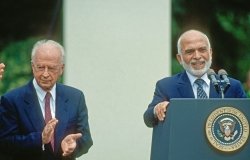Pathways to Peace: America and the Arab-Israeli Conflict
The recent upheavals in the Middle East are challenging long-held assumptions about the dynamics between the United States, the Arab world, and Israel. In Pathways to Peace, today's leading experts explain these changes in the region and their positive implications for the prospect of a sustained peace between Israel and the Arab World.
Overview
Daniel Kurtzer, S. Daniel Abraham Professor in Middle Eastern Policy Studies at Princeton University and former U.S. Ambassador to Egypt and Israel, discussed his new edited volume on approaches the United States could pursue to bring about an Arab-Israeli peace settlement.
On January 9, The Joseph and Alma Gildenhorn Middle East Forum of the Middle East Program hosted a meeting, “Pathways to Peace: America and the Arab-Israeli Conflict” with Daniel Kurtzer. Haleh Esfandiari, Director of the Middle East Program at the Wilson Center, moderated the event.
Kurtzer opened the presentation by discussing the process that led to the publication of Pathways to Peace: America and the Arab-Israeli Conflict, saying that while discussions of the peace process “have evoked more yawns than interest” in today’s politics, the Obama administration needs to take “a more active American approach” to negotiations. The essays included in the book agree that “status quos are not static” and that the context for potential negotiations would worsen in the absence of American efforts. Kurtzer said that the core idea of past efforts has been to push both sides to negotiate; however, in the geopolitical context of the Middle East today, there are fewer elements conducive to policymaking. As such, the United States needs to undertake the hard task of reframing the peace process in the current regional context, because a simple return to negotiations will likely not be fruitful.
Kurtzer outlined a number of policy elements brought up in Pathways to Peace that the United States should consider in its approach to the peace process. Among them, the United States should work to present a geographical template for a two-state solution that sets forth defined, secure borders. Such a plan would not be imposed on the parties participating in negotiations, but would serve as a starting template to discuss details and concerns. The United States should also act as a “security interpreter” for both sides, assessing what issues—“not mutually exclusive” —both Israel and Palestine would want addressed as separate states. Diplomats should also work toward making an independent Palestine a “viable state” by supporting its present infrastructural and economic development, which Kurtzer argued is essential to preventing a “failed state” in Palestine.
In addition, Kurtzer said, the United States should look at the processes, narratives, and concerns of regional actors. Rather than focusing on trying to change Israeli or Palestinian behavior as a precondition to talks, such as with Israeli settlements or refugee issues, the United States should contextualize efforts to change such behaviors as part of a broader “wide front” of advancing peace. In addition, the United States should encourage the Arab States that were part of the 2002 Arab Peace Initiative to act on several of their recommendations in the context of “a concerted peace strategy.” Lastly, the United States should encourage civil society organizations, religious institutions, and think tanks within Israel and the Palestinian Territories to “talk within each constituency” and examine their own narratives of history, conflict, and citizenship.
Recognizing that the real world of politics makes it difficult to follow through on recommended policy, Kurtzer advocated building a “language of understanding and support” within Israeli and Palestinian politics in an effort to develop a “common narrative… that doesn’t represent an impediment” to negotiations. He also asked each side to be honest about which of their ideals cannot be fulfilled, and asked for more empathy in diplomacy to understand the concerns and motivations of both Israelis and Palestinians.
By Laura Rostad, Middle East Program
Hosted By

Middle East Program
The Wilson Center’s Middle East Program serves as a crucial resource for the policymaking community and beyond, providing analyses and research that helps inform US foreign policymaking, stimulates public debate, and expands knowledge about issues in the wider Middle East and North Africa (MENA) region. Read more
Thank you for your interest in this event. Please send any feedback or questions to our Events staff.











